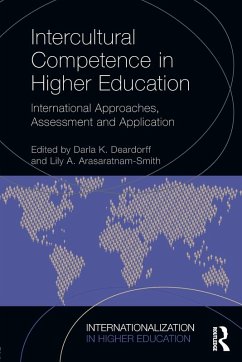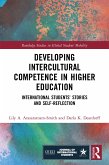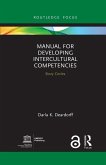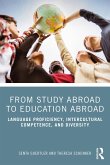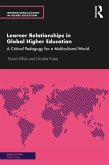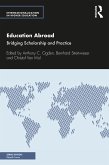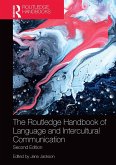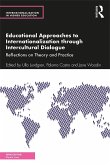Intercultural Competence in Higher Education features the work of scholars and international education practitioners in understanding the learning outcomes of internationalization, moving beyond rhetoric to concrete practice around the world.
Devoted exclusively to exploring the central learning outcomes of internationalization efforts, this edited volume contains a refreshing combination of chapters and case studies from interdisciplinary and cross-cultural contributors, including:
cutting-edge issues within intercultural competence development, such as intersectionality, mapping intercultural competence, and assessment;
the role of higher education in developing intercultural competence for peacebuilding in the aftermath of violent conflict;
facilitating intercultural competence through international student internships;
interdisciplinary and cross-cultural contributions from over 19 countries including Japan, Russia, Serbia, South Africa, and Vietnam;
the latest research and thinking on global, intercultural, and international learning outcomes, with a unique emphasis on newer voices.
Intercultural competence has become an essential element in international as well as domestic education. This text provides the latest thinking and research within the context of internationalization, presents practical case studies on how to integrate this into the preparation of global-ready students and will be of interest to postgraduate students, international education administrators, and practitioners, as well as scholars and researchers in a variety of disciplines who have an interest in intercultural and global competence.
Devoted exclusively to exploring the central learning outcomes of internationalization efforts, this edited volume contains a refreshing combination of chapters and case studies from interdisciplinary and cross-cultural contributors, including:
cutting-edge issues within intercultural competence development, such as intersectionality, mapping intercultural competence, and assessment;
the role of higher education in developing intercultural competence for peacebuilding in the aftermath of violent conflict;
facilitating intercultural competence through international student internships;
interdisciplinary and cross-cultural contributions from over 19 countries including Japan, Russia, Serbia, South Africa, and Vietnam;
the latest research and thinking on global, intercultural, and international learning outcomes, with a unique emphasis on newer voices.
Intercultural competence has become an essential element in international as well as domestic education. This text provides the latest thinking and research within the context of internationalization, presents practical case studies on how to integrate this into the preparation of global-ready students and will be of interest to postgraduate students, international education administrators, and practitioners, as well as scholars and researchers in a variety of disciplines who have an interest in intercultural and global competence.
Jos Beelen - Amsterdam University
It will definitely be an asset to have a book in which the latest developments are discussed. I would agree with the proposer that there is a fairly wide range of market audiences within HEis, such as educational developers, quality assurance officers, policy advisors and, foremost, specialists in ICC that assist colleagues to implement this concept into programmes of studies. In my experience, these specialists have a crucial role in curriculum (re)design. The book can be expected to remain valuable for a number of years as the issues it describes have been around for a while. The editor is undoubtedly a leading authority in the field.
Ken Cushner - Kent State University College
I am certain that there is interest in the book proposed by Deardorff and Arasaratnam-Smith, and I believe the interest will continue to grow in the years ahead. I see two principal markets in the USA, Britain, Australia, Canada: 1) as a textbook for graduate level classes in programs such as higher education administration as well as departments of teacher education and/or curriculum and instruction to enhance already existing courses in multicultural and international education; and, 2) as a resource for higher education administrators working in offices of international affairs (e.g., education/study abroad, international student services). Given this, I do agree with the author's evaluation of potential markets. Thus, if used in graduate level classes, I see it being used as a main text for courses in international higher education administration, as a supplementary text in courses in curriculum and instruction (multicultural or international/global education), and as a reference text for offices of international education as well libraries.
It will definitely be an asset to have a book in which the latest developments are discussed. I would agree with the proposer that there is a fairly wide range of market audiences within HEis, such as educational developers, quality assurance officers, policy advisors and, foremost, specialists in ICC that assist colleagues to implement this concept into programmes of studies. In my experience, these specialists have a crucial role in curriculum (re)design. The book can be expected to remain valuable for a number of years as the issues it describes have been around for a while. The editor is undoubtedly a leading authority in the field.
Ken Cushner - Kent State University College
I am certain that there is interest in the book proposed by Deardorff and Arasaratnam-Smith, and I believe the interest will continue to grow in the years ahead. I see two principal markets in the USA, Britain, Australia, Canada: 1) as a textbook for graduate level classes in programs such as higher education administration as well as departments of teacher education and/or curriculum and instruction to enhance already existing courses in multicultural and international education; and, 2) as a resource for higher education administrators working in offices of international affairs (e.g., education/study abroad, international student services). Given this, I do agree with the author's evaluation of potential markets. Thus, if used in graduate level classes, I see it being used as a main text for courses in international higher education administration, as a supplementary text in courses in curriculum and instruction (multicultural or international/global education), and as a reference text for offices of international education as well libraries.
Jos Beelen - Amsterdam University
It will definitely be an asset to have a book in which the latest developments are discussed. I would agree with the proposer that there is a fairly wide range of market audiences within HEis, such as educational developers, quality assurance officers, policy advisors and, foremost, specialists in ICC that assist colleagues to implement this concept into programmes of studies. In my experience, these specialists have a crucial role in curriculum (re)design. The book can be expected to remain valuable for a number of years as the issues it describes have been around for a while. The editor is undoubtedly a leading authority in the field.
Ken Cushner - Kent State University College
I am certain that there is interest in the book proposed by Deardorff and Arasaratnam-Smith, and I believe the interest will continue to grow in the years ahead. I see two principal markets in the USA, Britain, Australia, Canada: 1) as a textbook for graduate level classes in programs such as higher education administration as well as departments of teacher education and/or curriculum and instruction to enhance already existing courses in multicultural and international education; and, 2) as a resource for higher education administrators working in offices of international affairs (e.g., education/study abroad, international student services). Given this, I do agree with the author's evaluation of potential markets. Thus, if used in graduate level classes, I see it being used as a main text for courses in international higher education administration, as a supplementary text in courses in curriculum and instruction (multicultural or international/global education), and as a reference text for offices of international education as well libraries.
It will definitely be an asset to have a book in which the latest developments are discussed. I would agree with the proposer that there is a fairly wide range of market audiences within HEis, such as educational developers, quality assurance officers, policy advisors and, foremost, specialists in ICC that assist colleagues to implement this concept into programmes of studies. In my experience, these specialists have a crucial role in curriculum (re)design. The book can be expected to remain valuable for a number of years as the issues it describes have been around for a while. The editor is undoubtedly a leading authority in the field.
Ken Cushner - Kent State University College
I am certain that there is interest in the book proposed by Deardorff and Arasaratnam-Smith, and I believe the interest will continue to grow in the years ahead. I see two principal markets in the USA, Britain, Australia, Canada: 1) as a textbook for graduate level classes in programs such as higher education administration as well as departments of teacher education and/or curriculum and instruction to enhance already existing courses in multicultural and international education; and, 2) as a resource for higher education administrators working in offices of international affairs (e.g., education/study abroad, international student services). Given this, I do agree with the author's evaluation of potential markets. Thus, if used in graduate level classes, I see it being used as a main text for courses in international higher education administration, as a supplementary text in courses in curriculum and instruction (multicultural or international/global education), and as a reference text for offices of international education as well libraries.

